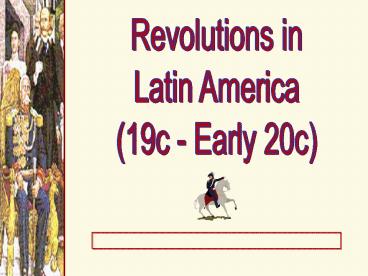Revolutions in Latin America: 19c-Early 20c - PowerPoint PPT Presentation
Title:
Revolutions in Latin America: 19c-Early 20c
Description:
European Empires: 1660s Causes of Latin American Revolutions Enlightenment Ideas writings of John Locke, Voltaire, & Jean Rousseau; Thomas Jefferson and Thomas Paine. – PowerPoint PPT presentation
Number of Views:173
Avg rating:3.0/5.0
Title: Revolutions in Latin America: 19c-Early 20c
1
Revolutions in Latin America (19c - Early 20c)
2
European Empires 1660s
3
Causes of Latin AmericanRevolutions
- Enlightenment Ideas ? writings of John Locke,
Voltaire, Jean Rousseau Thomas Jefferson and
Thomas Paine. - Creole discontent at being left out of government
jobs and trade concessions. - Inspiration of American and French Revolutions.
- Preoccupation of Spain Portugal in fighting the
Napoleonic Wars.
4
1. Enlightenment Ideas
- Laws of nature NATURAL LAWS govern natural
science and human society. - Give people rights ? life, liberty, property!
- Make fair societies based on reason possible.
- Challenged the theory of Divine Right monarchy.
5
Latin American Revolutions!
6
Toussaint LOuvetureLeads a Revolutionin
Haiti(1804)
7
Simón Bolivar The Brainsof theRevolution
- Creole leader of the revolutions in Venezuela.
- Spent time in Europe and the newly-independent
United States.
8
The Muscle of the Revolution
Bolivar coming from the North.
José de St. Martín and Bernard OHiggins cross
the Andes Mountains.
9
Bolivar San Martin Fight for Independence!
10
Bolivars Failure
- After uniting Venezuela, Columbia, Ecuador into
Gran Columbia, he left to help free the rest of
Latin America. - He died a year later, with his goal of uniting
all of South America unfulfilled!
11
LatinAmerican StatesAfter the Revolutions
12
Results of the Latin American Revolutions
13
1. Brazil Freed from Portugal
- The Portuguese royal family escaped Napoleon by
fleeing to Brazil. - Pedro I set up a new, independent kingdom in 1821
when his father returned to Portugal. - Pedro II assumed full power after Pedro I
abdicated his throne.
14
4. Independence Brought More Poverty
- The wars disrupted trade.
- The wars devastated the cities and the
countryside.
15
5. Left Many Countries in the Control of
Caudillos
- WHO WERE THEY?
- Mid-19c dictators ? military authoritarianism.
- Mostly wealthy creole aristocrats.
- Immediately followed the fight for independence.
- Posed as reformers with goals to improve the
economy and better the lives of the common people.
16
5. Left Many Countries in the Control of
Caudillos
- WHO WERE THEY?
- BUTOverthrew governments and took away basic
human rights. - Some attempted to make improvements, but most
just cared about themselves and their families
and friends nepotism. - Power changes usually occurred at bayonet-point
coup detats!
17
Latin American Imperialism
- Exported raw materials
- Imported manufactured goods
- Became heavily dependent on industrialized
nations - Natural resources made them attractive targets
for domination - Free-Trade Imperialism
18
Imperialism in Western Hemisphere
- Free Trade Imperialism created economic
dependence NOT territorial scramble - Any money/expertise to build came from Britain or
U.S. - Political elites encouraged foreign companies
(property owners became wealthy)
19
The CaribbeanAn American Lake
20
The Colossus of the North
- US dominated affairs in theAmericas.
- 1823 Monroe Doctrine.
- US takes Texas and Mexican Cession.
- US gains independence for Cuba.
- Roosevelt Corollary US will police the
America. - US sent troops to Cuba, Haiti, Mexico, Honduras,
Nicaragua. - US built Panama Canal Yankee imperialism.
21
The Panama Canal
22
Big Stick Foreign Policy
23
1913 Economic Imperialism?































